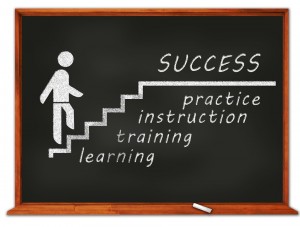Being A Finisher Leads To A Great Life
 Are you a great starter, but a poor finisher? It’s a common ailment.
Are you a great starter, but a poor finisher? It’s a common ailment.
The beginning of any adventure is full of excitement and enthusiasm, but it doesn’t always last.
Part of being a successful adult is learning how to finish things.
It’s part strategy and part grit. There are always a few sticking points to endure and overcome. Life can’t be all fun and games.
Develop The Habit Of Being A Finisher:
1. Understand when you’re likely to quit. Look at your past. When are you most likely to throw in the towel? What were your reasons for stopping at the time? Can you think of a strategy for getting through those times? Is there a way to avoid them altogether?
2. Dole out your time wisely. Getting caught up in too many meaningless projects won’t improve your ability to finish things. When possible, limit yourself to those things that really interest you. Life is too short for hobbies that make you want to shrug. If you’re passionate about something, you’re much more likely to get it done.
3. Track your progress. When you can visually see how much progress you’ve made, you’ll feel more motivated to continue. Make a chart, graph, or other visual representation of the work you’ve completed.

4. Visualize the expected result. Constantly remind yourself how great you’ll feel when you’re done. Make note of all the benefits you’re receive.
5. Have realistic expectations. If you didn’t start playing piano at a young age and practiced for several thousand hours before your 18th birthday, it’s unlikely you’ll ever reach the level of a world-class pianist. This is especially true if you’re 48 years old, have a family, and only have 30 minutes a day to practice.
• While it’s admirable to strive for perfection, be careful. You’ll always quit if perfection is the only acceptable outcome. Have realistic expectations for your situation.

6. Be realistic with your timetable. You might be making good progress, but if you believed that you should’ve mastered the Russian language by now, you’ll become discouraged. It’s not easy to estimate the amount of time it will take to complete something.
• Do you have a history of thinking that things will take less time than they actually do? Build a fudge-factor into your estimates.
• After you’ve make a little progress, revisit your expectations and adjust them accordingly.
• If you’re enjoying yourself, who cares how long it takes? Once you’re done, the fun is over!
7. Get better at finishing the small tasks in your life. If you’re washing the dishes, avoid leaving that greasy, disgusting pan until morning. Fold all the clothes rather than leaving some of them for later. Clean the entire room. Pay all of the bills. Run the full 3 miles you planned to run.
• Finishing is a habit. Get in the habit of finishing all of the tasks in your life.
One habit you may want to form is meditating. Unlike habits that are bad for you, meditation can do many things to improve multiple aspects of your life. Click below to get your meditations as a free gift!
• There’s no way to stop the criticism, but you don’t have to allow it to bother you.
These small tips can be a great help in finishing future projects. If there’s one trait you’ll find in high-achievers, it’s the ability to get things done. Half-finished projects are incredibly wasteful. You put in a lot of work and didn’t receive the benefit. Learn how to finish and observe the impact it has on your life.


